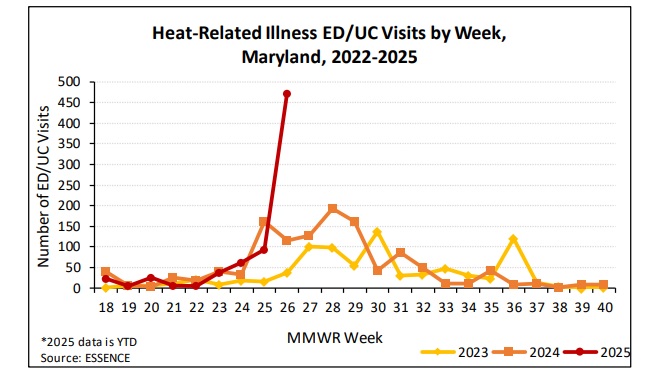Eleven people have died from the heat this summer in Maryland and hundreds have gone to emergency rooms and urgent care clinics to get treated for heat-related illnesses, according to the state’s health department.
The Maryland Department of Health said nine of the 11 people who died were 65 and older.
A 2-year-old girl died in May after she was left in a hot car for several hours in Montgomery County, marking the first heat-related death of the year.
Data from the health department shows 177 people went to emergency rooms and urgent care centers because of heat-related illnesses from June 29 to July 5.
More than 470 people in Maryland sought treatment amid a blistering heat wave the week before, according to the data.

The vast majority of the people who have gone to ERs and urgent care centers this summer for heat illnesses are 18 to 44 years old, the health department said.
Most of the reported illnesses happened in the areas of Baltimore, Anne Arundel, Carroll, Harford and Howard counties and the city of Baltimore, according to data. The region with the second-most reported illnesses includes Montgomery, Prince George’s, Calvert, Charles and St. Mary’s counties.
In 2024, Maryland reported 27 total heat-related deaths.
Tips for preventing heat-related illnesses
Extreme heat can lead to serious health issues for anyone, but health officials say people under age 5 or over age 65, people with chronic illnesses, those taking certain medications and people exercising or working outdoors have a greater risk.
The Maryland Department of Health has the following tips to prevent health issues from the heat:
- Drink plenty of fluids to prevent dehydration. Don’t wait until you’re thirsty. Drink two to four glasses of water or fruit juice each hour. Avoid alcohol, caffeine and overly sweetened beverages.
- Wear loose-fitting, lightweight, and light-colored clothing.
- Stay in air-conditioning when possible. If your home is not air-conditioned, consider visiting a shopping mall, public library or cooling center. Electric fans will not prevent heat-related illness. Marylanders in need of energy assistance should call 2-1-1, Maryland’s information and referral service.
- Never leave children or pets in a car. Even with the windows cracked. Even for just a minute.
- Avoid direct sunlight by staying in the shade.
- Wear sunscreen, a wide-brimmed hat, and sunglasses.
- Take it easy outdoors. Take short breaks if you feel tired. Schedule physical activity in the morning or evening, when it is cooler.
- Avoid salt tablets unless your doctor toldyou to take them.
- Check on elderly relatives or neighbors daily. Make sure they have a cool place to be during extreme heat.
Symptoms of heat-related illnesses
Health officials said there are three types of heat illness:
- Heat cramps: Short, severe cramps in the muscles of the leg, arm or abdomen. This can happen during or after heavy exercise in extreme heat. Heavy sweating uses the body’s supply of salts, which causes cramps. Heat cramps also may be a symptom of heat exhaustion.
- Heat exhaustion: Happens when a person spends time in a hot environment without drinking enough fluids. Symptoms include extreme thirst, fatigue, weakness, clammy skin, nausea or vomiting, and rapid breathing.
- Heat stroke: The most serious heat-related illness. Heat stroke occurs when body temperature rises to as much as 106°F or higher within 10 to 15 minutes. Heat stroke can cause death or permanent disability if the person doesn’t get emergency treatment. Symptoms of heat stroke include red, hot and dry skin, no sweating and rapid, weak pulse.
from Local – NBC4 Washington https://ift.tt/fnMmQ3x



0 Comments